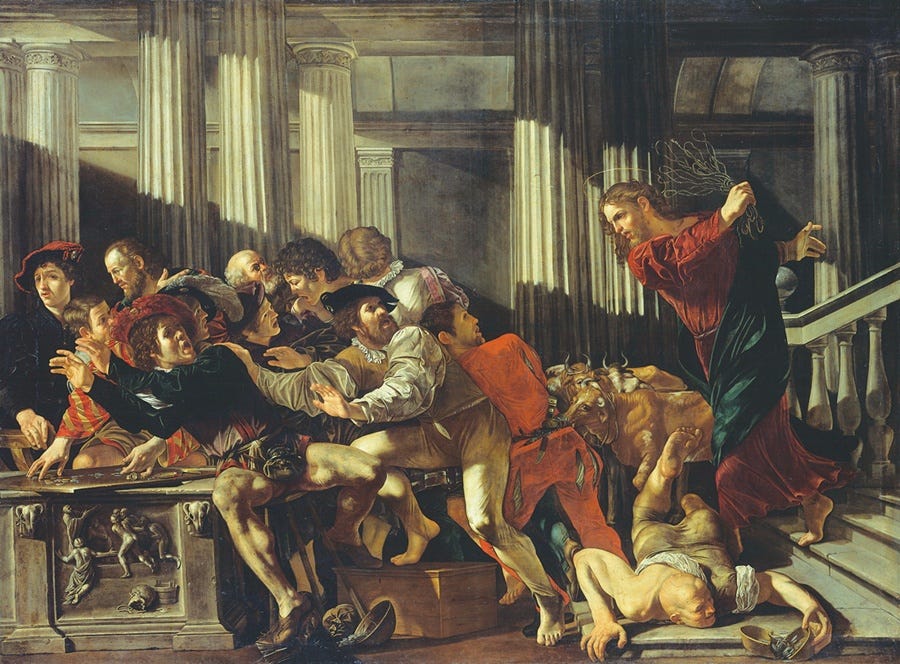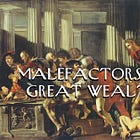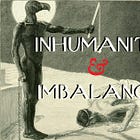The Worship of Wealth
When it’s a question of money, everyone is the same religion
“Money, not morality, is the principle of commercial nations.”
— Thomas Jefferson, 1810
“MAMMON, n. The god of the world’s leading religion. The chief temple is in the holy city of New York.”
— Ambrose Bierce, 1906
Society, in its haste to worship the rich, has conflated wealth and morality.
We seem too eager to grant carte blanche to any moral transgressors, offering them special dispensation as readily as the Cardinal of the Diocese of Boston allows Catholics to eat corned beef on Friday March 17 during the season of Lent, as long as their offshore bank accounts have 11 figures, their company’s market cap stays in the hundreds of billions of dollars, and their yachts have room for dozens of guests, two helicopters, three speedboats, four bartenders, and a pony.
Throughout history, the tension between wealth and morality has manifested in various forms — from the venality of the Gilded Age to the current worship of oligarchs of Silicon Valley, a pantheon where their wealth affords them not only power but a moral license to act with impunity.1
Why have we allowed this to happen?
The Point of Prosperity
Our system of capitalism has produced more wealth and more advances for humanity than any other system. Like any system, it has flaws, but the progress we’ve witnessed has granted us longer lifespans, the ability to communicate with each other instantly around the world, and more opportunities for a greater swath of society.
Those who have mastered the alchemy of commerce are rewarded richly, in some cases ascending from a lower class to the throne of aristocracy — a social ranking not defined by birth or nobility, but by the cold, impersonal forces of capital.
And the opposite, in some circles, seems to be just as accepted. Lewis H. Lapham observed:2
“I could discover no common cause among the several degrees of rightist separation (conservative, neoconservative, libertarian, reactionary, and evangelical) other than the moral lesson invariably found in their one and only cautionary tale: money ennobles rich people, making them strong as well as wise; money corrupts poor people, making them greedy as well as weak.”
This seems to be a uniquely American thing, where ironically, our system of government was founded to escape a monarchical society. The American Dream© dangles before us the ever elusive promise that we can all be part of the 1%, if only we work hard enough, when in reality, it is a system designed to keep many at the lower rungs.
And so we strive on, connecting our net worth with our validation as people.
“No European associates wealth with personal merit or poverty with personal failure. But to the American what is important is not so much the possession of money but the power to earn it ‘as a proof in of one’s manhood’.” 3
Indeed, in this clip from Piers Morgan Uncensored last week, Scott Galloway harshly calls out our worship of certain wealthy individuals who are doing great harm to our society. Turn up your volume for this two-minute clip:4
“The whole point of prosperity is that you can protect people.”
Nothing New Under the Sun
“I am indeed rich, since my income is superior to my expense, and my expense is equal to my wishes.”
— Edward Gibbon, 1776
While we may like to think that this is unique, never-before-seen development of humanity ( look at what money has done to us, Galloway says), the fact is we’ve seen this before.
As the Roman republic unraveled and transformed into an empire ruled by a monarch worshipped as a god, the historian Sallust (c. 86-35 BC) enumerated the forces driving this change:
“[U]nequal distribution of wealth, exorbitant veterans’ demands, de-population of the countryside, high unemployment of citizens, debt-ridden farmers, bread and circuses, costly military ventures, oppressive taxes for some, and a government controlled by wealth.”
The time and place may different, but human nature remains undefeated. We want the same things we’ve always wanted: we want security, we want to be acknowledged, and we want to be part of something bigger than ourselves.
The warnings are here. Should citizens wish to avoid the mistakes of the past, we can learn from the best among us.
The individual pictured in the image at the top of this newsletter was focused on how we treat the least among us. Surely our good fortune can help us to help others.
Stay tuned for a follow-up installment on moral leadership: what it is, why we need it, and how we can integrate it into our work.
There’s so much to learn,
Further Reading
“‘We will coup whoever we want!’: the unbearable hubris of Musk and the billionaire tech bros,” The Guardian, November 25, 2023
“Holy Dread,” Lapham’s Quarterly, Volume 1, Number 2, Spring 2008
Lewis H. Lapham, Money and Class in America: Notes and Observations About Our Civil Religion, 1988
Source: @profgalloway on Threads, Jun 5, 2025







